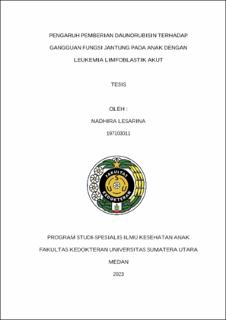| dc.description.abstract | Daunorubicin is the most potent chemotherapy regimen used to treat acute lymphoblastic leukemia. However, this treatment has the potential to cause dose-dependent cardiotoxicity, which initially manifest as asymptomatic cardiac dysfunction and evolving irreversibly to congestive heart failure. The aim of the study was to evaluate an effect of Daunorubicin treatment on impaired heart function in pediatric acute lymphoblastic leukemia. A prospective cohort study in July-October 2023, including 30 subjects with acute lymphoblastic leukemia who had received induction phase chemotherapy according to the 2018 national protocol for standart risk and high risk by doing echocardiography to determine systolic and diastolic function before and after receiving Daunorubicin at H. Adam Malik General Hospital. The results was analyzed using the Wilcoxon test to determine differences in heart function. Subjects had significantly effected left ventricular systolic function and right ventricular diastolic function compared to before Daunorubicin treatment. Tricuspid annular plane excursion (TAPSE) measurements lower in before treatment than after 2 mm (1,6-2,5) vs. 2,2 mm (1,8-3), p = 0,03. E/A ratio lower in before treatment than after 1,3 (1-1,9) vs. 1,5 (1-2,1), p = 0,01. Pediatric acute lymphoblastic leukemia treated with Daunorubicin showed differences of right ventricular systolic function and left ventricular diastolic function. Detection of early cardiac impairment should be mandatory in order to prevent additional risk factors and progression of the cardiovascular toxicity. | en_US |


